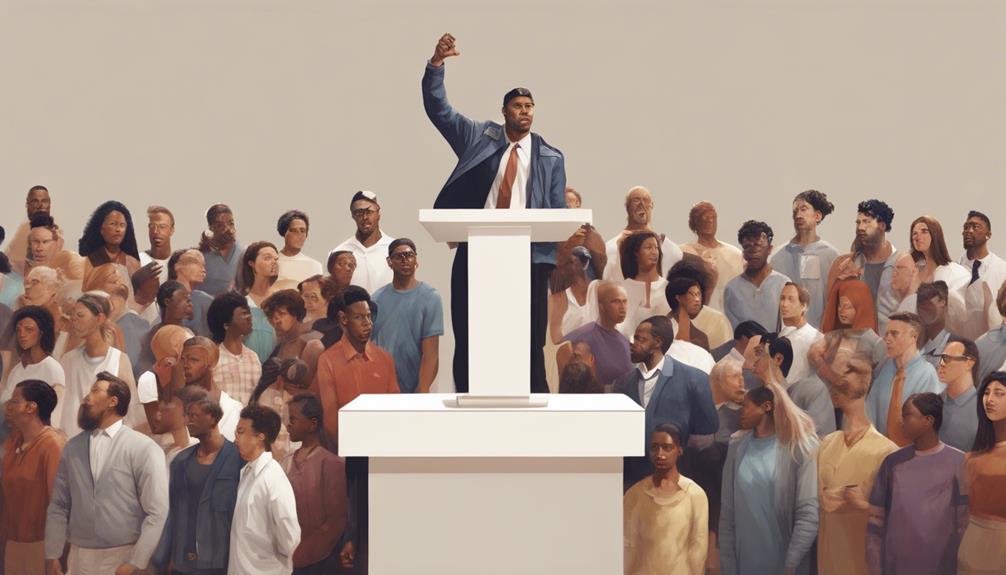Within the realm of freedom of expression lies a complex web of legal, ethical, and societal boundaries that dictate the extent to which individuals can exercise their right to speak freely. While the foundational principles of free speech are enshrined in many democratic societies, the practical application of this freedom faces numerous challenges. From navigating the fine line between protecting individual liberties and preventing harm to grappling with the ever-evolving landscape of digital communication, the discussion surrounding the limits of freedom of expression is far from straightforward. As we explore the nuances of this debate, we uncover the intricate tapestry of factors that shape our understanding of what truly defines the boundaries of free speech.
Key Takeaways
- Ethical considerations and societal interests guide boundaries of free speech.
- Hate speech laws curb harmful rhetoric to protect marginalized groups.
- Balancing individual rights with public safety is crucial in defining speech limits.
- Technology plays a role in moderating online speech to prevent harm and promote responsible expression.
Ethical Considerations of Free Speech
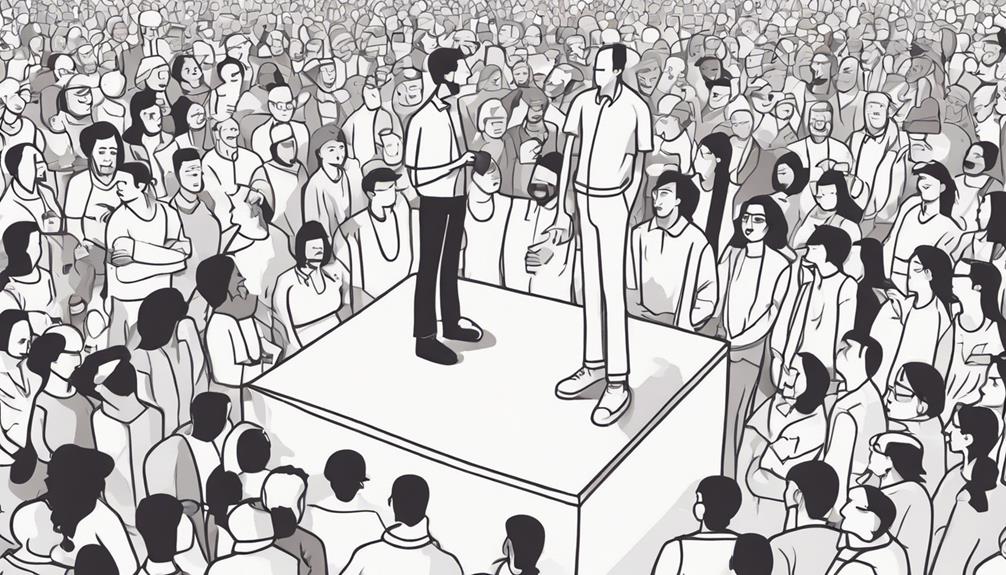
Balancing individual liberties with societal interests is a fundamental ethical consideration when discussing the limits of freedom of expression. The First Amendment protects the right to free speech, but this right is not absolute. Ethical considerations come into play when evaluating the impact of speech on others and determining where boundaries should be set. While individuals have the right to express their thoughts and opinions, this right must be weighed against the potential harm or offense it may cause to society as a whole.
In ethical free speech discussions, it is vital to recognize that rights come with responsibilities. Responsible use of free speech involves respecting diverse perspectives and engaging in constructive dialogue. Cultural norms, beliefs, and values also play a significant role in shaping ethical guidelines for free speech. Understanding the implications of speech, particularly on marginalized or vulnerable groups, is crucial in navigating the complex interplay between individual rights and societal interests. By considering these ethical considerations, we can strive to promote a more inclusive and respectful discourse within society.
Balancing Individual Rights and Societal Interests
In the ethical considerations surrounding freedom of expression, the delicate equilibrium between individual rights and societal interests is a pivotal focal point. When examining this balance, it is crucial to weigh the protection of First Amendment rights against the need to safeguard public safety and address clear and present dangers that may arise from unrestricted speech. Societal interests encompass a broad spectrum, including maintaining public order, upholding national security, and shielding individuals from harm or discrimination.
To illustrate this delicate balance, consider the following table:
| Individual Rights | Societal Interests |
|---|---|
| First Amendment protection | Public safety |
| Right to free expression | Clear and present danger |
| Personal liberties | Restrictions on free speech |
| Freedom of speech | Social harmony |
| Right to dissent | Preventing conflicts or violence |
Courts often grapple with the complexities of these competing interests when determining the boundaries of freedom of expression. Restrictions on free speech may be warranted when the exercise of such rights poses a significant risk to public welfare or infringes upon the rights and safety of others. Striking a balance between individual liberties and societal well-being remains a critical challenge in modern democratic societies.
Harm Caused by Hate Speech
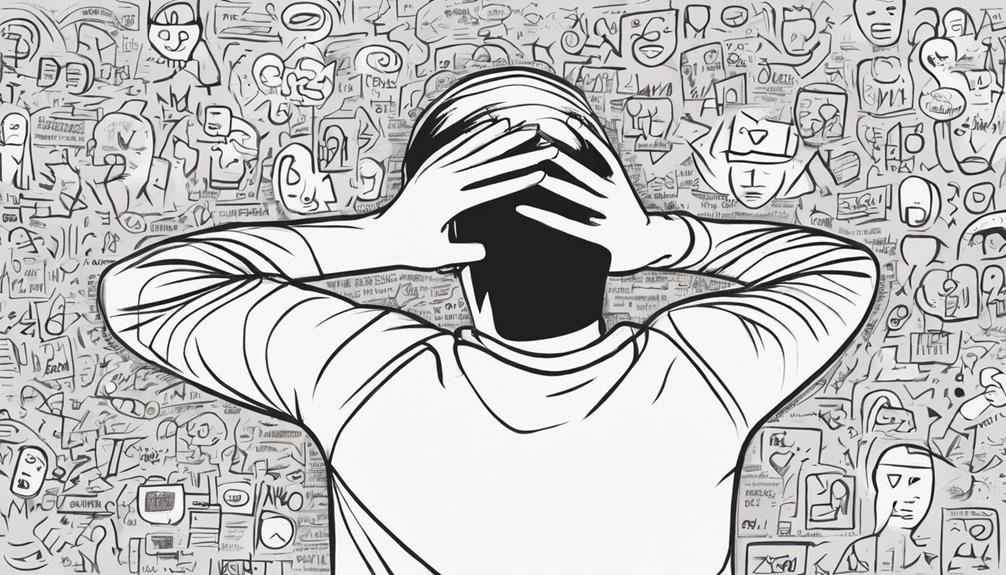
Hate speech poses a significant threat to societal harmony and individual well-being by fueling discrimination, prejudice, and violence against marginalized groups. Research indicates a direct link between hate speech and increased hate crimes directed at specific communities. The psychological impact of hate speech cannot be understated, as it can lead to severe consequences such as anxiety, depression, and a pervasive sense of insecurity among those targeted. Moreover, the hostile environment created by hate speech impedes social cohesion and undermines inclusivity within society. International human rights standards acknowledge the detrimental effects of hate speech and advocate for strategies to combat its dissemination. Recognizing the profound harm caused by hate speech is essential in understanding the broader implications it has on both individuals and the fabric of society. Addressing this issue requires a multifaceted approach that prioritizes the protection of marginalized groups and the promotion of a more tolerant and respectful public discourse.
Legal Restrictions on Freedom of Expression
Legal restrictions on freedom of expression serve as necessary safeguards to prevent harm and maintain societal order. Hate speech laws, in particular, aim to curb discriminatory rhetoric that can incite violence or discrimination. National security concerns also play a role in delineating the boundaries of free speech, highlighting the complex interplay between individual liberties and public safety.
Speech and Harm
Restrictions on freedom of expression are established to mitigate the potential harm that speech may cause, particularly in cases involving incitement to violence or true threats. The distinction between protected speech and harmful speech is crucial, with harmful speech encompassing statements that present an imminent lawless action or pose a clear and present danger of imminent harm. True threats, designed to intimidate or instill fear of harm, do not fall under the protection of the First Amendment. Incitement to imminent lawless action, as outlined in the Brandenburg v. Ohio case, is also subject to legal restrictions. In essence, limitations on freedom of expression are in place to prevent harassment, unlawful behavior, or speech that leads to harm or disruption, ensuring a balance between individual rights and societal well-being.
Hate Speech Laws
Safeguarding societal harmony and protecting vulnerable groups, laws governing hate speech navigate a complex terrain of balancing freedom of expression with the prevention of discrimination and violence. Hate speech laws, varying by country, aim to curb speech inciting hatred, discrimination, or violence against specific groups based on characteristics like race, religion, or sexual orientation. Countries such as Germany and Canada impose penalties, including fines and imprisonment, for hate speech offenses. These legal restrictions seek to uphold social cohesion, prevent violence, and safeguard the dignity and rights of individuals and communities. However, defining hate speech remains contentious, as it involves subjective assessments of the harm inflicted on targeted groups. The Supreme Court often plays a crucial role in interpreting and applying hate speech laws to protect the rights of all individuals while maintaining societal order.
National Security Concerns
In the realm of protecting national security interests, the Supreme Court acknowledges the necessity of withholding certain information from the public domain. Government interest in safeguarding the nation often justifies limited restrictions on freedom of expression. Prior restraint, such as censorship before publication, is only deemed acceptable when there is clear and imminent danger to national security. Exceptions to First Amendment protection, like obscenity, are subject to scrutiny due to their potential to incite harm or disrupt public order. Determining what falls under the category of obscenity can be contentious and raises concerns about subjective interpretation and the risk of governmental overreach. Consequently, expressions deemed obscene may face censorship, particularly in the realms of art and entertainment, where the balance between freedom of expression and national security interests is delicate.
Defamation and Libel Laws
Defamation and libel laws play a crucial role in safeguarding individuals' reputations by providing legal recourse against false statements that damage their standing in society. Libel, which pertains to written defamation, and slander, which involves spoken defamation, are subject to legal action if they meet specific criteria. To establish defamation, the statement must be proven false, published, and result in harm to the individual's reputation. Public figures encounter a higher burden of proof in defamation cases due to the protections afforded by the First Amendment. Jurisdictions may have varying defamation laws, with some requiring evidence of malice in certain instances. These laws serve as a balance between freedom of expression and the protection of individuals from unjust attacks on their character. Understanding the nuances of defamation and libel laws is essential for maintaining accountability in communication while respecting the boundaries of reputation and integrity.
Censorship Versus Protection of Vulnerable Groups
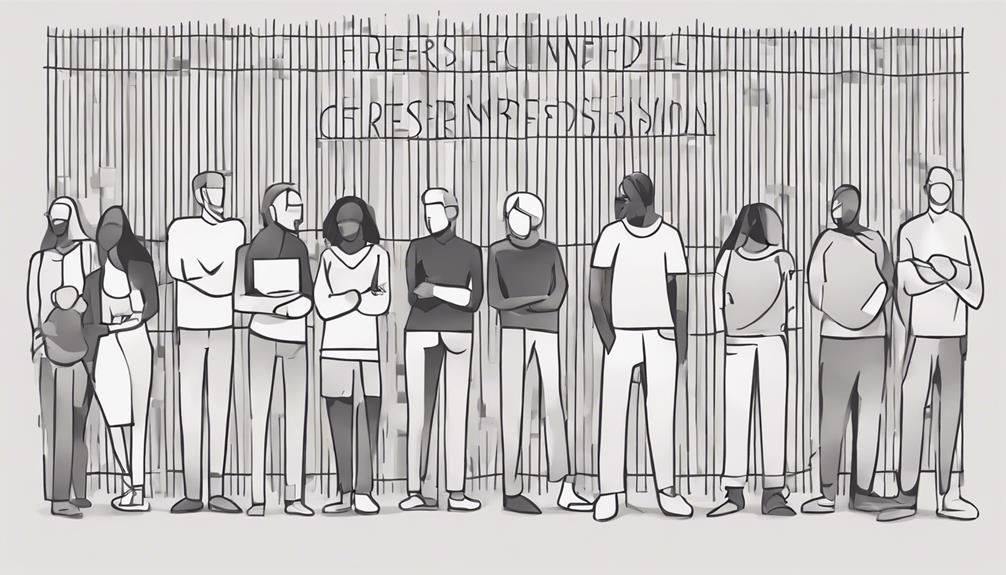
Censorship presents a complex dilemma as it challenges the principles of freedom of expression, while protecting vulnerable groups is essential to prevent harm and discrimination. Striking a balance between these conflicting objectives involves navigating the rights of individuals to speak freely and the risks posed to marginalized communities by harmful speech. This discussion on censorship versus protection of vulnerable groups underscores the intricate interplay between upholding freedom of speech and safeguarding the well-being of those most at risk.
Censorship Challenges Freedom
The dilemma between preserving free expression and safeguarding vulnerable populations presents a complex challenge in the realm of censorship. Balancing the rights enshrined in the First Amendment, such as freedom of speech, with the need to protect vulnerable groups from harmful or offensive content requires careful consideration. Governments and organizations often grapple with determining the appropriate level of censorship to shield vulnerable populations while allowing diverse viewpoints to be heard. To better understand the challenges at hand, let's delve into the key aspects of censorship versus protection of vulnerable groups in the table below:
| Censorship Challenges | Impact on Vulnerable Populations |
|---|---|
| Protection from harm | Ensures psychological well-being |
| Balancing rights | Upholds dignity and respect |
| Complex decision-making | Safeguards against discrimination |
| Content evaluation | Prevents marginalization |
| Societal implications | Fosters inclusivity and safety |
Protecting Vulnerable Groups
In the intricate landscape of safeguarding vulnerable populations amidst the realm of free expression, the critical balance between upholding individual rights and preventing harm emerges as a paramount challenge.
Key Considerations:
- First Amendment: The protection of vulnerable groups must navigate the boundaries of the First Amendment, ensuring that while free speech is upheld, harmful speech targeting these groups is restricted.
- Protected Speech: Recognizing what constitutes protected speech while also addressing hate speech that poses a threat to vulnerable communities.
- Human Rights: Upholding international human rights standards plays a crucial role in emphasizing the need to shield vulnerable groups from discrimination and harmful rhetoric.
Balancing Rights and Risks
Navigating the complex terrain of safeguarding vulnerable populations within the realm of free expression demands a delicate balance between protecting individual rights and mitigating harm. The First Amendment upholds the right to free speech, but this right is not absolute when it comes to harmful speech that targets vulnerable groups. While some forms of speech are considered protected speech, such as political discourse, others that incite violence or promote discrimination may warrant censorship to shield vulnerable populations. Balancing these rights and risks requires a nuanced approach that considers the societal impact of speech on marginalized communities. By carefully weighing the benefits of free expression against the potential harms inflicted on vulnerable groups, a harmonious equilibrium between safeguarding individuals and upholding essential freedoms can be achieved.
Political Implications of Regulating Speech
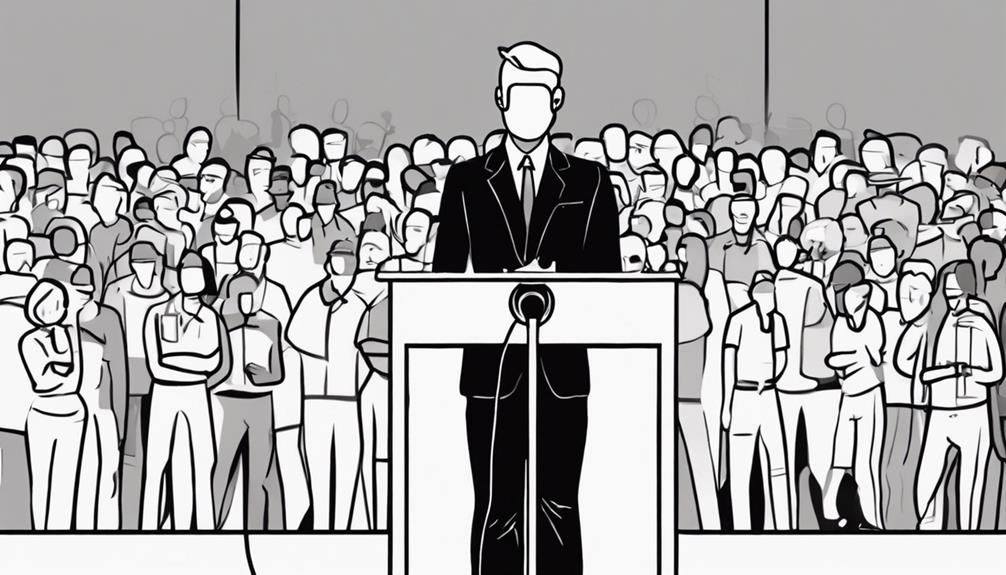
Regulating political speech poses a critical challenge in balancing the preservation of democratic values with the prevention of harm or violence. When delving into the political implications of speech regulation, several key points come to light:
- Government Intervention: The involvement of the government in regulating political speech raises concerns about potential censorship and encroachment upon fundamental democratic principles. Striking a balance between ensuring public safety and upholding free speech rights is a delicate task that requires thoughtful consideration.
- Impact on Public Discourse: Restrictions on political speech can have significant repercussions on public discourse and citizens' ability to actively participate in political dialogues. Limiting certain forms of expression may hinder the exchange of diverse ideas and viewpoints crucial for a vibrant democratic society.
- Complexity of the Issue: The complexity of regulating political speech is further amplified by the evolving landscape of social media and online platforms. Determining what constitutes harmful speech, especially in the realm of Fighting Words or speech that incites imminent violence, is a multifaceted challenge that demands continuous examination and adaptation.
International Perspectives on Free Speech
How do different countries around the world approach the concept of free speech within the framework of their legal systems and societal values? In the United States, free speech is strongly protected under the First Amendment, with restrictions mainly limited to speech that incites imminent lawless action. However, the Amendment does not protect certain types of speech, such as obscenity, defamation, incitement to violence, and true threats. Symbolic speech, like flag burning, is also safeguarded under the First Amendment.
Contrastingly, countries like Australia strike a balance between free speech and public order by imposing limitations to maintain decency and prevent harm. In contrast, countries such as Germany and France have laws that criminalize hate speech and deny the Holocaust to combat the dissemination of harmful ideologies. International human rights standards, as outlined in the Universal Declaration of Human Rights, acknowledge the right to freedom of expression while allowing for restrictions in specific circumstances.
As global debates persist on the delicate equilibrium between free speech and harm prevention, different nations continue to adopt diverse legal frameworks to navigate complex and contentious issues surrounding freedom of expression.
The Role of Technology in Shaping Free Speech Debates

The evolution of technology has fundamentally reshaped the landscape of free speech debates, introducing novel complexities and considerations in the digital realm. Technology's role in shaping free speech debates is profound, influencing the way individuals communicate, share information, and express their opinions in online spaces.
Key Considerations:
- Regulation on Online Platforms: Social media platforms like Facebook and Twitter have become central to public discourse, but they also enforce their own terms of service, raising questions about the limits of free speech in digital spaces.
- Balancing Free Speech and Censorship: Technology enables the rapid spread of information, leading to debates on how to balance free speech with the need to prevent harmful content online, prompting discussions on censorship and moderation practices.
- Protecting Rights in Digital Spaces: The digital age has expanded the reach of free expression, but it has also introduced new challenges in protecting individual rights while ensuring the safety and integrity of online environments.
Technology's influence on free speech debates underscores the importance of navigating the complexities of online communication while upholding fundamental principles of free expression.
Frequently Asked Questions
What Are the Limitations of Freedom of Expression?
The limitations of freedom of expression encompass various aspects such as hate speech, national security, public safety, incitement to violence, and defamation laws. Understanding these boundaries is imperative for ensuring a balanced approach to free speech rights. Upholding these limitations protects individuals and society from harm while maintaining the fundamental principles of democracy. It is essential to navigate these restrictions with sensitivity and respect for the diverse perspectives and rights of all individuals involved.
How Is Freedom of Expression Limited?
Freedom of expression is limited in various ways to balance the protection of speech with societal interests. Restrictions may apply to hate speech to prevent discrimination and maintain public order. National security concerns can curtail certain forms of expression to safeguard the country. Incitement to violence is prohibited to prevent harm. Defamation laws restrict false statements that harm someone's reputation. These limitations serve to uphold the values of a democratic society while safeguarding individual rights.
What Is Not Allowed Under Freedom of Speech?
Hate speech, inciting violence, defamation laws, obscenity restrictions, and national security regulations are not allowed under freedom of speech. These categories encompass speech that goes beyond the boundaries of protected expression. Hate speech and incitement of violence can lead to harm and are not tolerated. Defamation laws protect individuals from false statements that damage their reputation. Obscenity restrictions aim to uphold community standards, while national security restrictions prevent speech that jeopardizes the safety of the nation.
What Are Three Limitations Placed on Freedom of Speech and Press?
When examining limitations on freedom of speech and press, important considerations include hate speech regulation, national security restrictions, and defamation consequences. Hate speech may be regulated to prevent harm and discrimination. National security concerns may impose restrictions on certain forms of expression. Defamation can lead to legal consequences when false statements harm someone's reputation. Understanding these limits helps maintain a balance between free expression and societal values.
Conclusion
In the complex landscape of freedom of expression, the boundaries are defined by ethical considerations, legal restrictions, and societal interests. Like a delicate dance between individual rights and public safety, the regulation of speech remains a contentious issue. As technology continues to shape the way we communicate, the debate on free speech will only intensify. Finding a balance between protecting vulnerable groups and upholding democratic values is crucial in navigating the limits of freedom of expression.
